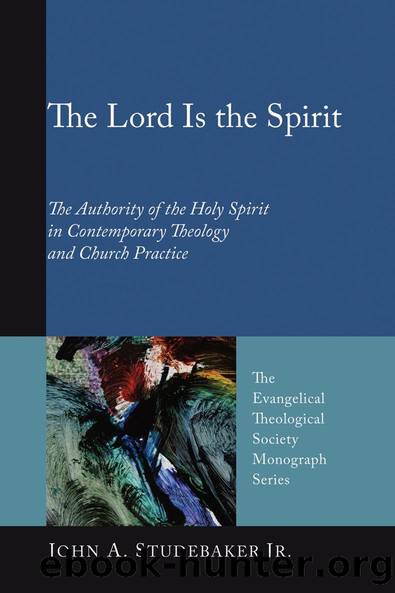The Lord Is the Spirit: The Authority of the Holy Spirit in Contemporary Theology and Church Practice (Evangelical Theological Society Monograph Series Book 7) by Studebaker John A. Jr

Author:Studebaker, John A. Jr.
Language: eng
Format: epub
Publisher: Pickwick Publications
Published: 2014-12-03T23:00:00+00:00
First, Welker and other cotemporary theologians decry a need for a pluralistic âpouring outâ of the Spirit in present times, so that diverse communities of the Spirit may come forth. Welkerâs pneumatology cries for a ârestoration of solidarity and of the communityâs capacity for actionâ (as he sees portrayed in OT deliverance through the hands of the Judges) and as a result eschews the oppressive tendencies of âmodern, totalizing metanarrativesâ in view of the âpublic transformation of powerholders and of political power structures.â170 Referring to Bonhoefferâs critique of modern individualism, Welker reminds us that the Spirit,
is not bound up with an abstract, uniform individualism that reduces everything to an unrealistic, abstract quality, reducing everything to âthe ego,â the subject, the decision-maker, the consumer, or the payee. The individualism of the Spirit is marked by diverse concreteness and by concrete diversity, without crumbling into the indeterminate pluralism of âpureâ individuality.171
In our exegesis of Isa 59:21 we also saw that the Spiritâs central eschatological activity involves the fulfillment of the New Covenant, a fulfillment that occurs in accordance with the Spirit of Restoration and the Word of Promise. Such activity produces the initial effect of the Spirit within the entire âremnant communityâââdemocratizationââwhich is eventually fulfilled according to Joelâs vision. This specific effect of the Spirit not only allows this community to remain hopeful in a time of eschatological tension but also, in accordance with the Word of Promise, becomes an instrumental element in the Spiritâs restoration activity. While this community may and should seek political/societal liberation as a tangible demonstration of the Spiritâs âdemocratizingâ effects (and as a âdownpaymentâ of eschatological liberation), this community does not exist primarily for the purpose of societal liberation; neither is the Spirit discovered primarily as the power of God that combats differences and creates political solidarity. Rather, the âdemocratizingâ Spirit is for the community the guarantee of future covenantal blessings, a âgoverning authorityâ that will not only create an eschatological unity in the presence of Messiah, but is creating that unity now in the presence of the Messianic Spirit. This âcovenant of the Spiritâ demonstrates the initial effect of the Spirit of redemptionâdemocratizationâas Yahwehâs covenant faithfulness to his remnant people.
The âSpirit of Restoration,â as we saw in our biblical theology, brings forth such restorative effects in this community according to an eschatological âblueprint.â Whereas the promise of eschatological fulfillment in Isa 59:21 (the âCovenant of the Spiritâ) âextends to Godâs people throughout the progression of redemptive history,â172 the fulfillment of New Covenant is a specific action of the Spirit of Restoration does not begin until the Church age. The Spirit is both the guarantee of the fulfillment of Godâs New Covenant promises as well as the guarantor, the one who restores the world according to these promises. Like good parents who prepare their children to handle their inheritance well, the Spirit prepares the children of God to receive their divine inheritance.
The âpouring out of the Spiritâ in Acts 2 is indeed the initial and immediate fulfillment of the New Covenant demonstrating the Spiritâs âdemocratization.
Download
This site does not store any files on its server. We only index and link to content provided by other sites. Please contact the content providers to delete copyright contents if any and email us, we'll remove relevant links or contents immediately.
Fangirl by Rainbow Rowell(9229)
How to Bang a Billionaire by Alexis Hall(8146)
Wonder by R. J. Palacio(8098)
The Thirst by Nesbo Jo(6932)
The Space Between by Michelle L. Teichman(6932)
Assassin’s Fate by Robin Hobb(6200)
Wiseguy by Nicholas Pileggi(5770)
The Night Circus by Erin Morgenstern(5217)
Paper Towns by Green John(5179)
The Kite Runner by Khaled Hosseini(5170)
Bittersweet (True North #1) by Sarina Bowen(4843)
Gerald's Game by Stephen King(4642)
Too Much and Not the Mood by Durga Chew-Bose(4338)
Pillow Thoughts by Courtney Peppernell(4272)
Goodbye Paradise(3802)
Twelve Days of Christmas by Debbie Macomber(3559)
Good by S. Walden(3548)
The Rosie Effect by Graeme Simsion(3461)
The Cellar by Natasha Preston(3335)
